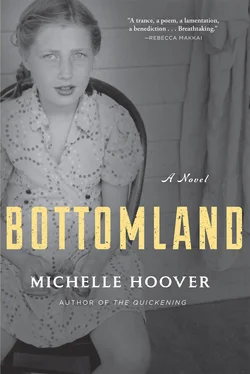He chewed at his cheek. “What you say we bring our wagons in together next trade. Keep them from underselling us.”
I sighed at him. “Next time, then.”
Elliot seemed relieved. He drummed his knuckles on the table and turned to watch the Clarks come. “House full of women.”
“All that work with only the girls to help.”
“Clark is sickly more than most,” he said. “He was sick something awful last year. Heart.”
I shook my head. In the churchyard two miles distant, the Clarks owned a stone and five empty lots. Elliot sat a while, his face fallen. He seemed to stew on something dark and close in coming.
“A good man,” said Elliot again. “And no sons. We have ourselves sons for more than threshing, don’t we? Should Wilson want them.”
“Should Wilson not keep to his senses, you mean.”
Elliot held up his glass as if to measure me through it.
“A man must support his president,” I said.
“Right.” His mouth softened, only just. “I suppose it’s eating time.”
“Always is.”
“These women, they like to keep themselves busy.”
“My Margrit works herself to the bone.”
“I can’t say I understand it, but it sure pleases Mary to have company. It pleases her a great deal.”
The voices of Mrs. Clark and her brood carried over the fields. Our yard was soon filling with children. Mr. Clark could only but lift his hat and wave. A man such as him. He might well land in the grave from nothing more than a skip in his blood.
Our kitchen door banged.
“Ready!”
In a frenzy, Esther raced out. She wore an old canvas sack cinched with a rope at her waist. Nan chased after her. Esther stopped and spun. She curtsied to Nan before running again. The Clark girls screamed, and I reached for my belt.
But again the door to our kitchen opened. Margrit emerged with a tray of sausages. My wife had a flower in her hair. She smiled as she set the tray to the table. “ Würstchen, ” she said. “ Würstchen, ” Mary repeated after her. Her husband grunted. The children grew quiet. When at last my wife sat, her blue dress matched the flowers Mary had brought, their color a vision against her whiter skin. Once I had not known this woman. Now I knew her more than well. Across from her, our children crowded the single bench. How strange it was to see them lined up as they were, Myrle as always between them. They straightened the ribbons in her hair. Tucked a napkin to her collar. I felt the weight of that letter in my pocket. How loath I was to open it, with little reason I could explain. My children appeared so alike in every feature, their faces as sharp and fine as that of my parents. Once the meal came to its end, they surely would scatter. I could not so much as reach across the table to prevent it. But for now, my wife held them close, as if by a string.
It was late in the day when Margrit and I sat in the quiet of our parlor. Outside, the last of the sun lit the grassy trail the Clarks had left in their wake. Only Nan stayed with us in her corner, yawning as she sewed.
“Nan, dear,” said Margrit. “You should take a rest.”
“I’m fine, Mother.”
Nan sat a while longer but soon gathered her things. Margrit touched her arm before she went. “You did so well with helping. Didn’t she, Julius?”
“Very well.”
Nan blushed and gave her mother a kiss.
I reached into a pocket for my handkerchief. I discovered the sharp corner of the envelope instead.
“I think our Nan has a beau,” said Margrit. “Julius, are you listening? It’s Carl McNulty.”
“Carl,” I said. “The boy who lives alone with his mother?” I drew the envelope out and studied the stamps. Hamburg, two weeks since.
“You’re afraid of that letter.”
“No, no.” The envelope was thin as a leaf. The slightest tremor might turn it to dust. When I opened it, the German script came to me like an old scent.
Dear Julius,
Forgive me, but I only just found your address among your mother’s papers, and I am writing to you with news of your parents. I’m afraid they’ve passed. Your father had a stroke in the fields a month back, and it must have pained your mother something to find him. Yesterday morning, Samuel discovered her with her head on the table, just after breakfast. She had taken her bread out of the oven, at least, so it didn’t smoke the house. She was a good woman, your mother. Your father as well. He left the land and the house to us, what remains of it. I know your mother would have wanted otherwise. She often talked of you and your letters. Both are buried in Schubert’s field, a small service as it was the best we could manage.
We will take care of the land and the house for as long as you wish, unless you can arrange a return. Travel here is ever the worse. Every boy has put on his boots for war, and the Kaiser would rather starve us than give way to France. We haven’t the feed to keep our cattle. Our potatoes look blacker this year than the last. A quiet place like this might not survive all the trouble. I dare say your parents might have escaped the worst of it, if you can find peace in that. You are better off where you are.
Your cousin,
Martha Hess
“What is it, Julius?”
I closed the letter in my lap. The room seemed to dim. Margrit clicked her needles. Outside, the cicadas droned and the Elliot pups yowled from their barn. Oh, the food we had wasted. The expense of those tablecloths. I imagined them hanging in the parlor as curtains, sown in patches. Now with the letter from my cousin, the last string had been clipped. I had nothing in the old country left to me. Little way to return. How often had I wished the same? “ Schwierigkeit ,” Martha had written. Trouble. The beginnings of a war. A thing so distant we could only but stand in the early dark and think of our milking. How could war be trouble any more than burying a mother and father? And only weeks from each other? I had been absent to witness both. I might never have stepped foot in the place. Never been born.
“Julius.” Margrit rested her fingers on mine.
“Trouble in Germany,” I said.
“What sort of trouble?”
Out the window, my daughters ran in their bare feet from the river. In her belted sack, Esther looked dry as a bone. Myrle plodded behind, her dress soaked. Her skin showed pink underneath, her hair wet on her cheeks. She shivered. I thought to call out to her, but could not find my voice. When the curtain fell back, the sight vanished.
“Julius.” Margrit crouched at my side. She had turned the letter so she might read it.
I closed the page in my fist. “It’s over now. It’s gone.”
Every day of that fall, I thought of little but Clark and his ailing heart, his five empty graves. I owned but a hundred and fifty acres, a decent lot of land for my sons. Yet others after us had bargained more. Every year at harvest, their wagons stood heavier with grain. Their horses strained. He left the land to us , wrote my cousin. I had never wanted the family acres. My own were far the closer and ever growing. Still, a good half dozen were wasted by their nearness to the river. A good half saved if I straightened the channel. Made that mud into something stronger to hold a seed, to drive the plow. The water lay like a boundary never to be trespassed. Yet I would trespass. Damn if Elliot helped or not.
My sons and I were thick in the worst of it. Two days of mud with only the aid of our horses, the tractor at the end. The water ran four hands deep at the driest times of year. Yet when it was full, those banks lost inches. Now with the river low, we had only strength enough to build a wall of timber and stone to shore up our banks, keep the river on its course. When at last our efforts held, a shadow broke over us.
Читать дальше












